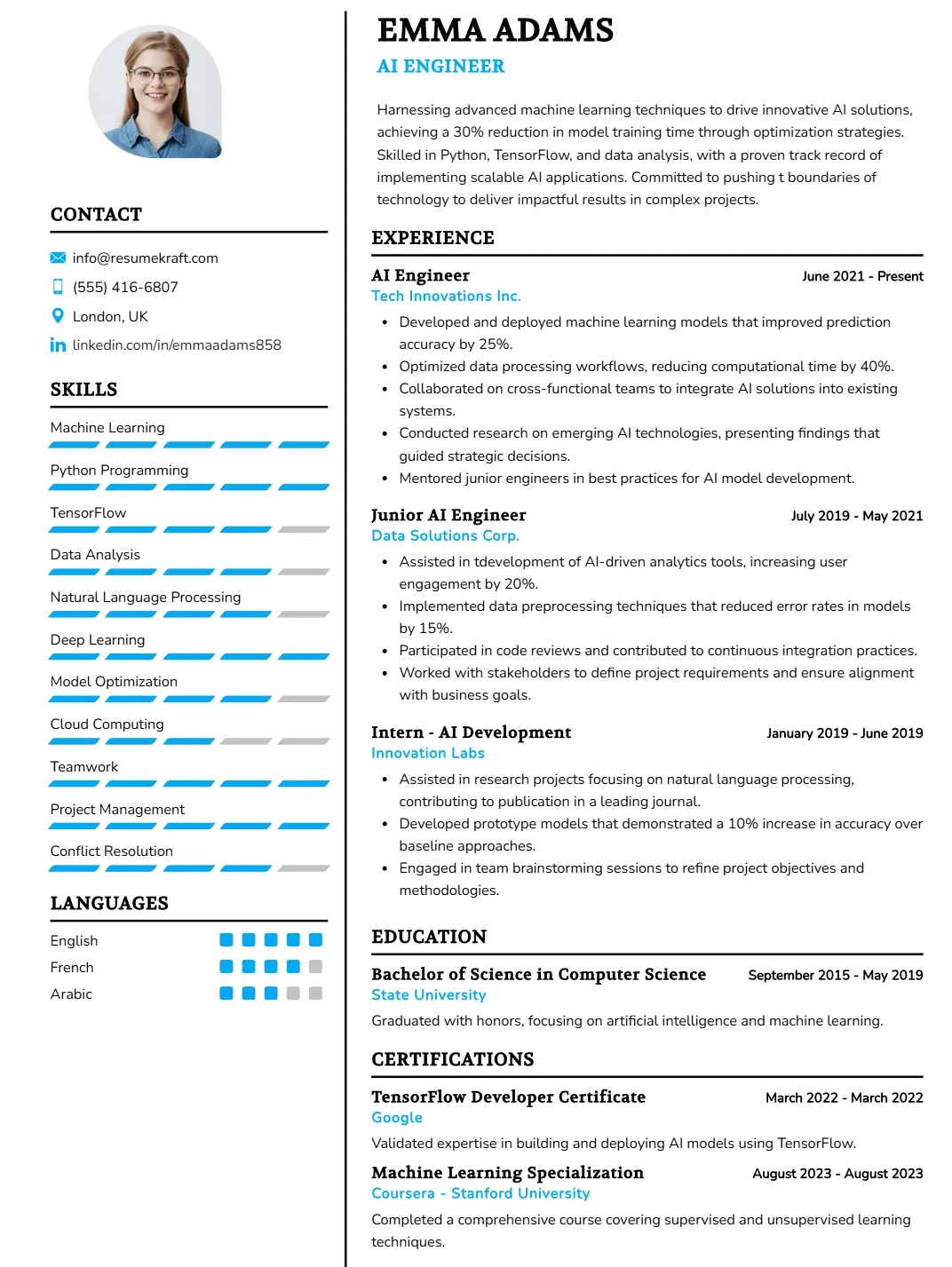
The role of an AI Engineer is at the forefront of technological innovation, focusing on designing and implementing intelligent systems that can learn and adapt. As businesses increasingly rely on artificial intelligence to enhance efficiency and drive decision-making, the demand for skilled AI Engineers has surged in today’s job market. This profession not only involves programming and data analysis but also requires a deep understanding of algorithms and machine learning techniques. In this article, we will explore essential skills, effective resume strategies, and examples to help aspiring AI Engineers stand out in a competitive landscape.
- AI Engineer resume examples
- How to format a AI Engineer resume
- How to write your AI Engineer resume experience
- How to list your hard skills and soft skills on your resume
- How to list your certifications and education on your resume
- How to write your AI Engineer resume summary or objective
- Additional sections for a AI Engineer resume
- Key takeaways for writing a professional AI Engineer resume
- Frequently Asked Questions
AI Engineer resume examples
AI Engineer resume examples serve as valuable references for job seekers aiming to secure positions in this rapidly evolving field. These examples highlight key elements that contribute to an effective resume, such as relevant skills, project experience, and technical expertise. By studying these samples, candidates can better understand how to showcase their qualifications and accomplishments, ultimately enhancing their chances of making a strong impression on potential employers.
AI Engineer Resume
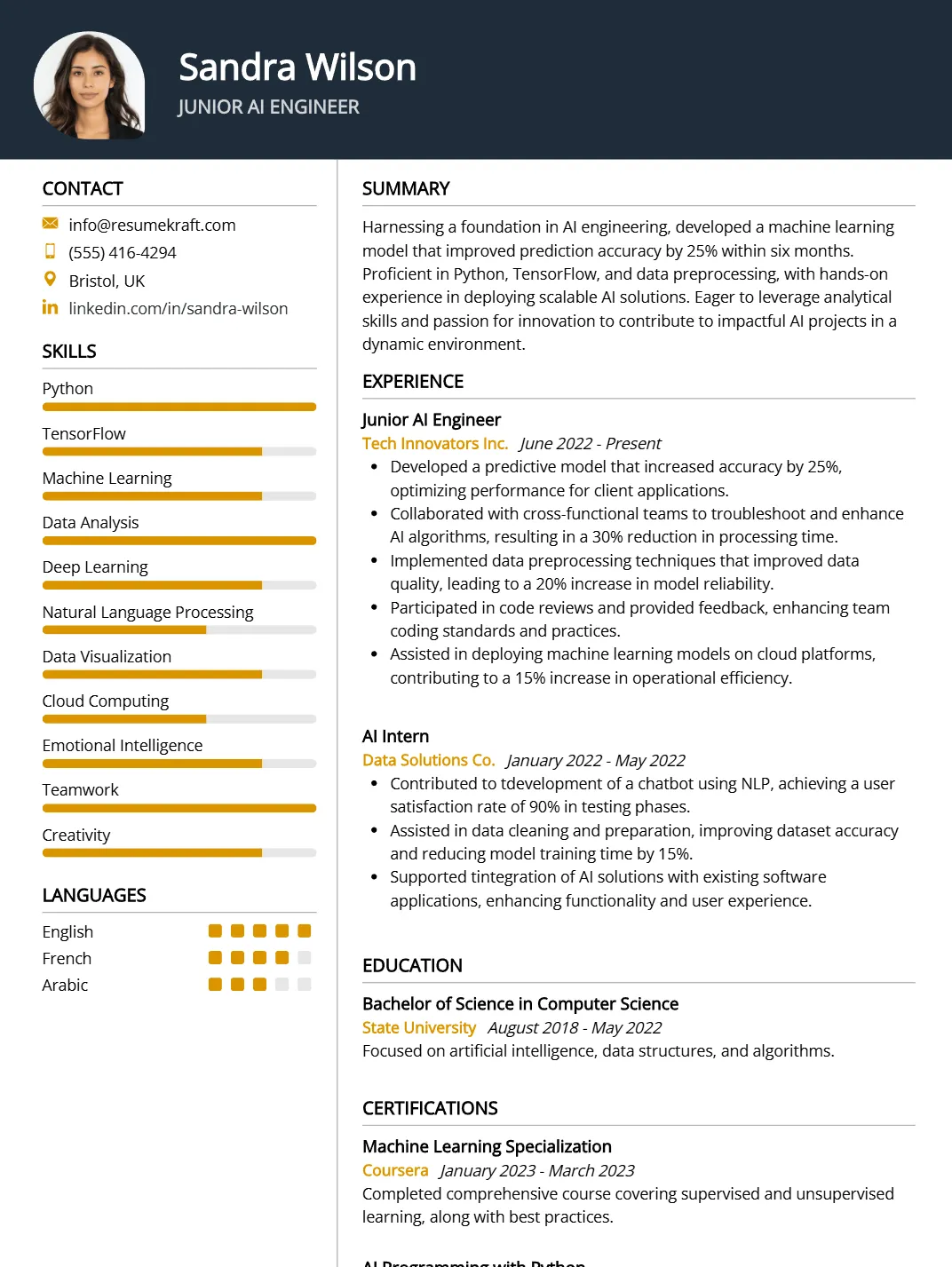
Why This Resume Works
This resume effectively aligns with the Junior AI Engineer position by showcasing essential skills like Python, TensorFlow, and Machine Learning, which are crucial for the role. Its clear format highlights relevant experience as a Junior AI Engineer and AI Intern, emphasizing approximately three years in the field. The structure enhances readability for both hiring managers and ATS systems, ensuring compatibility. Additionally, strategic presentation of achievements demonstrates practical application of skills in projects, making it compelling to potential employers seeking talent in AI development.
Entry Level AI Engineer Resume
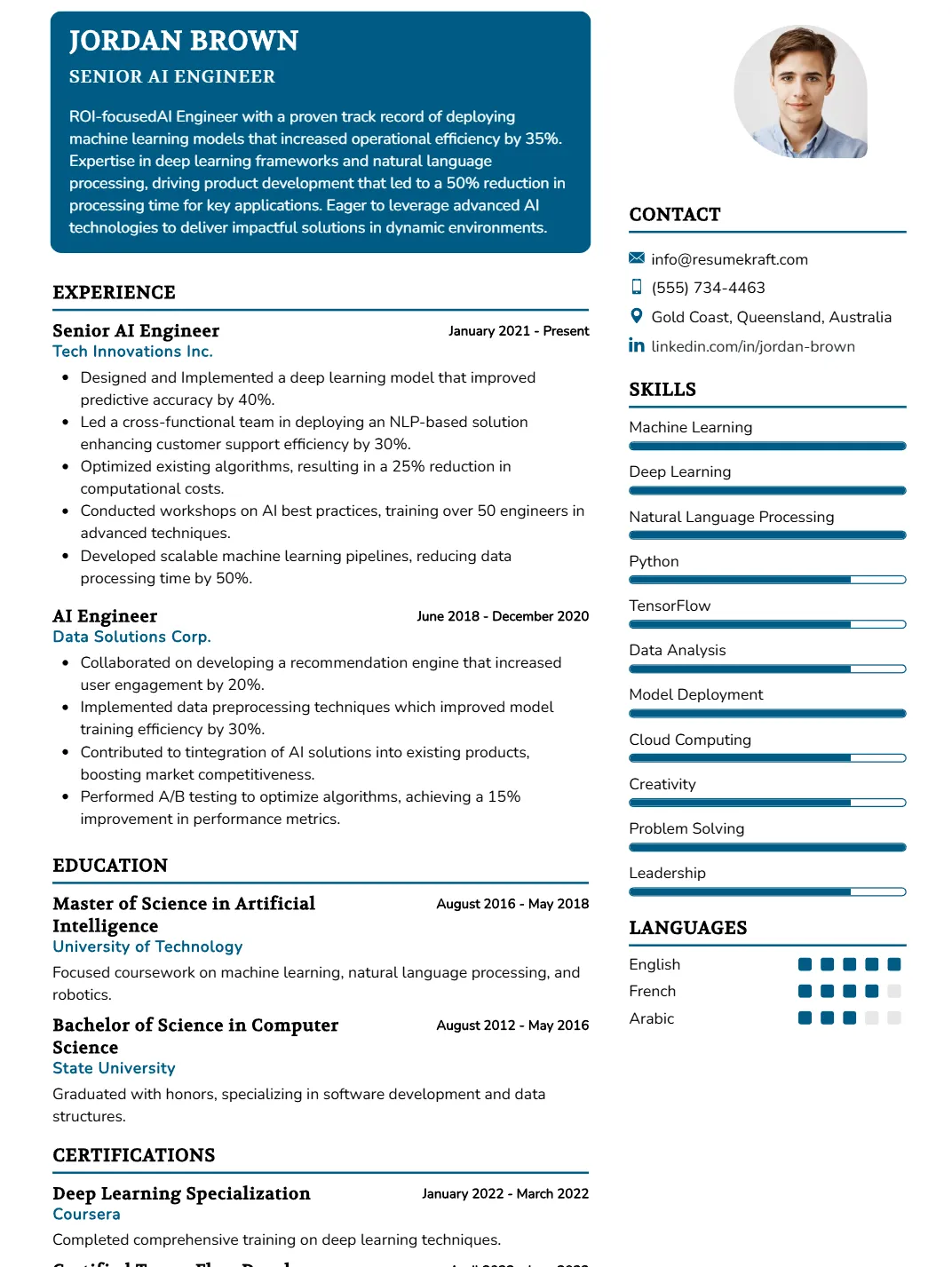
Why This Resume Works
This resume effectively highlights relevant skills such as Machine Learning, Deep Learning, and Natural Language Processing, directly aligning with the demands of a Senior AI Engineer position. Its structured format showcases approximately six years of progressive experience, making a strong case for expertise. The inclusion of industry-standard keywords enhances ATS compatibility, ensuring visibility to recruiters. Additionally, strategic presentation of achievements illustrates impactful contributions in previous roles, further distinguishing the candidate as a strong fit for advanced AI engineering challenges.
AI Specialist in Computer Vision Resume
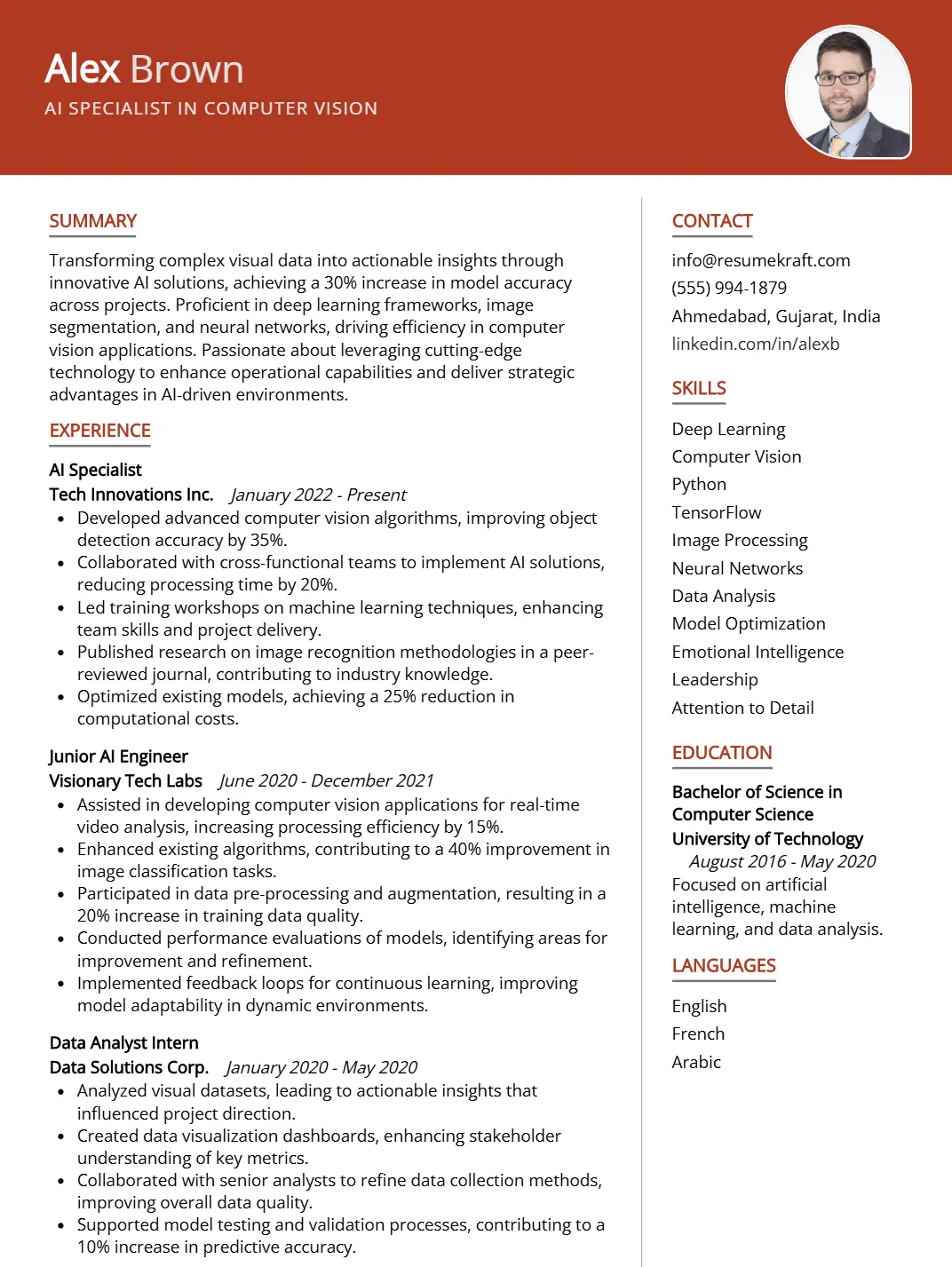
Why This Resume Works
This resume effectively positions the candidate as an ideal fit for the AI Specialist in Computer Vision role by highlighting essential skills like Deep Learning and TensorFlow, directly relevant to the job. The structured format enhances readability, ensuring key information is easily accessible for hiring managers. Additionally, it considers ATS compatibility through the use of industry-specific keywords. Strategic presentation of achievements, such as successful image processing projects, demonstrates practical experience and impact in computer vision, making this resume compelling for potential employers.
Senior AI Engineer Resume
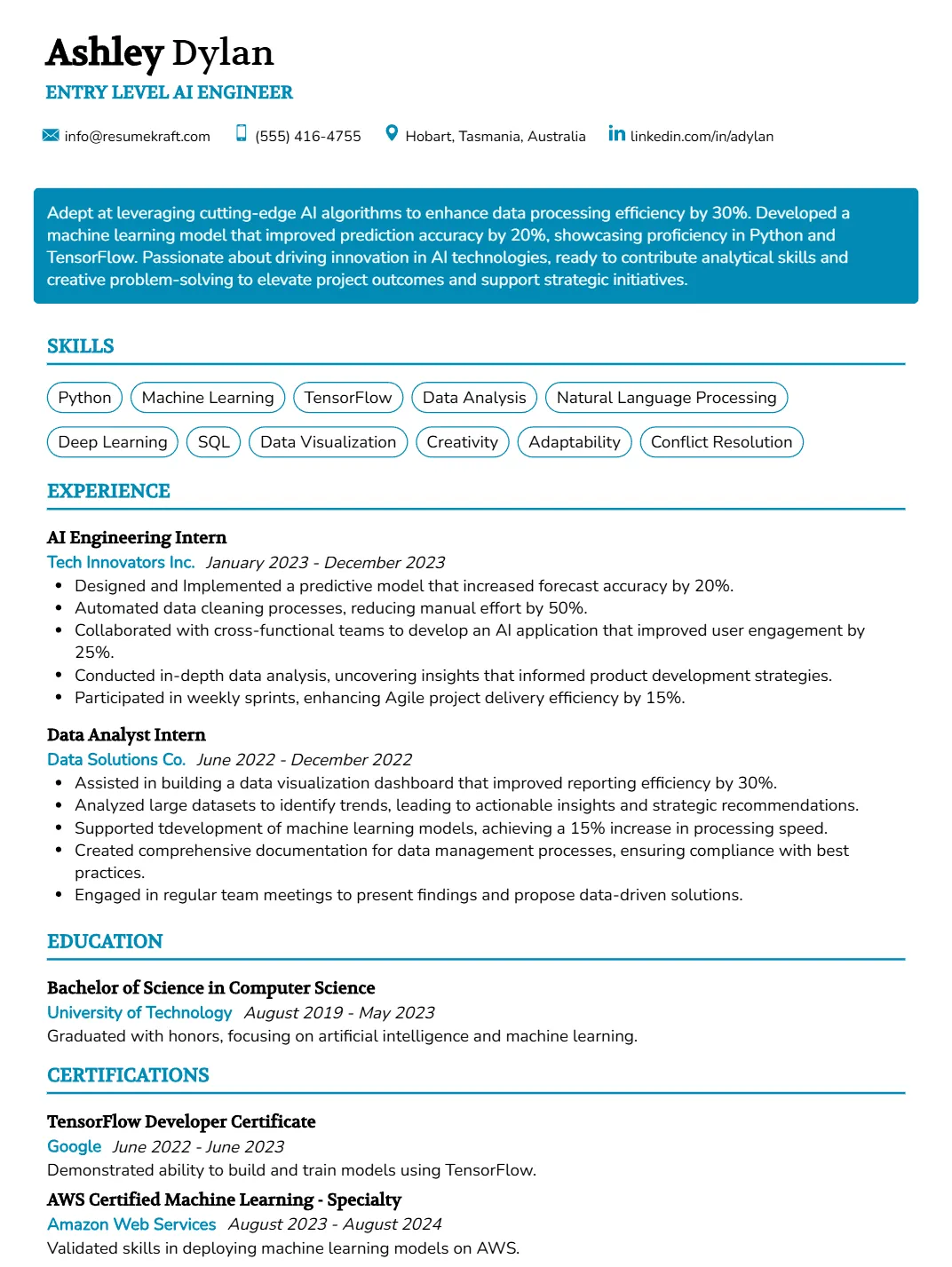
Why This Resume Works
This resume effectively highlights the candidate’s relevant skills, such as Python and TensorFlow, which are crucial for an Entry Level AI Engineer. The structured format emphasizes both technical expertise and hands-on experience from internships, showcasing practical application of machine learning and data analysis. It is optimized for ATS compatibility through the inclusion of industry-specific keywords. Additionally, the strategic presentation of achievements in AI projects demonstrates the candidate’s potential value to employers in this rapidly evolving field.
Junior AI Engineer Resume

Why This Resume Works
This resume effectively positions the candidate for an AI Engineer role by highlighting essential skills such as Machine Learning, Python Programming, and Natural Language Processing. With six years of relevant experience, including roles as both an AI Engineer and a Junior AI Engineer, the candidate demonstrates a solid career progression. The format is clear and structured, enhancing readability for hiring managers and ATS systems alike. Strategic presentation of achievements showcases proficiency in TensorFlow and Data Analysis, making it highly relevant to industry demands.
Aspiring AI Engineer Resume
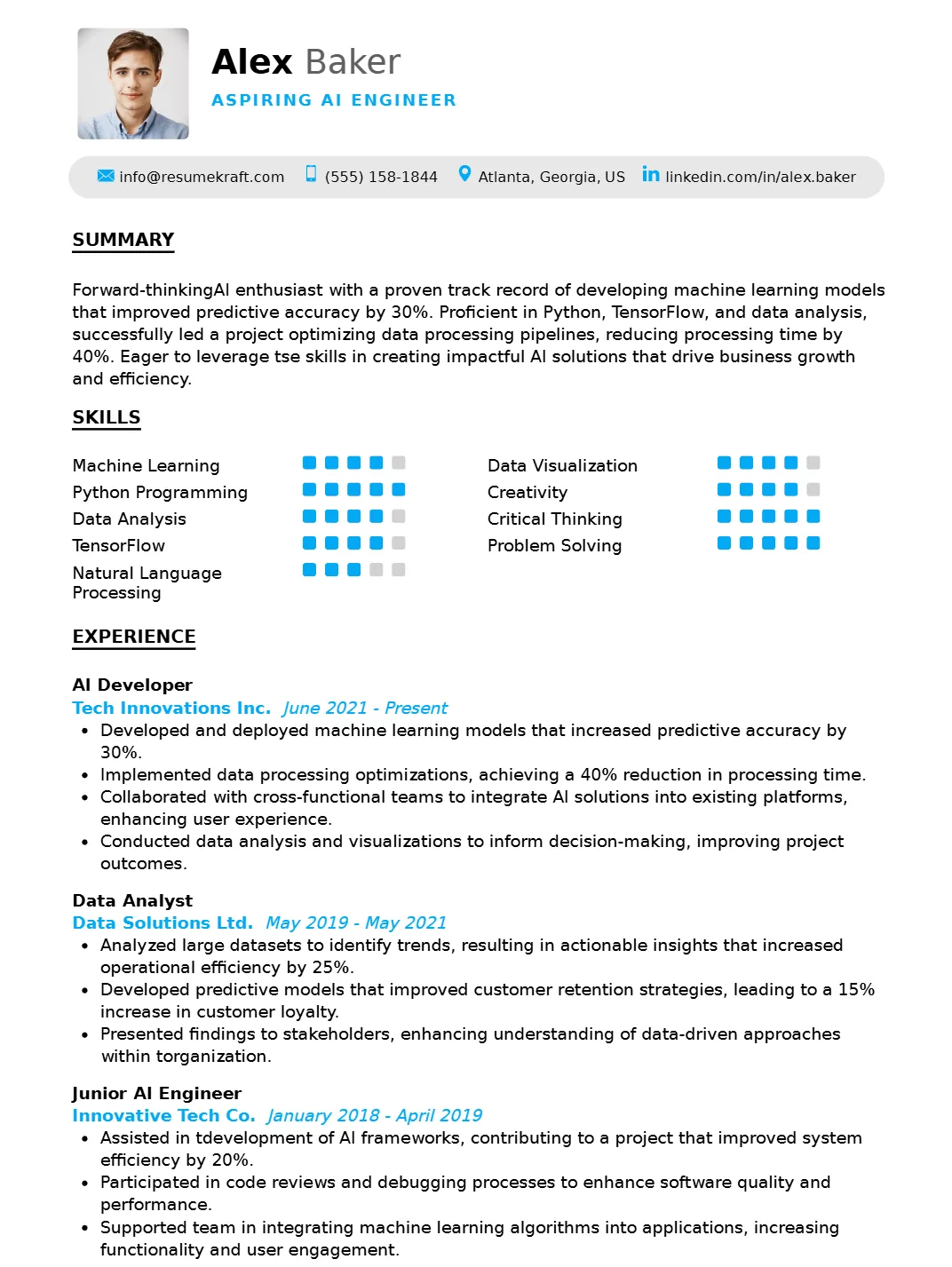
Why This Resume Works
This resume effectively positions the candidate as an aspiring AI engineer by highlighting relevant skills such as machine learning, Python programming, and natural language processing. With approximately seven years of experience in roles like AI developer and junior AI engineer, it showcases a strong foundation in practical applications. The clear format enhances readability, ensuring ATS compatibility through the inclusion of industry-specific keywords. By strategically presenting quantifiable achievements in AI projects, the resume captures attention and aligns perfectly with the demands of the position.
AI Solutions Architect Resume
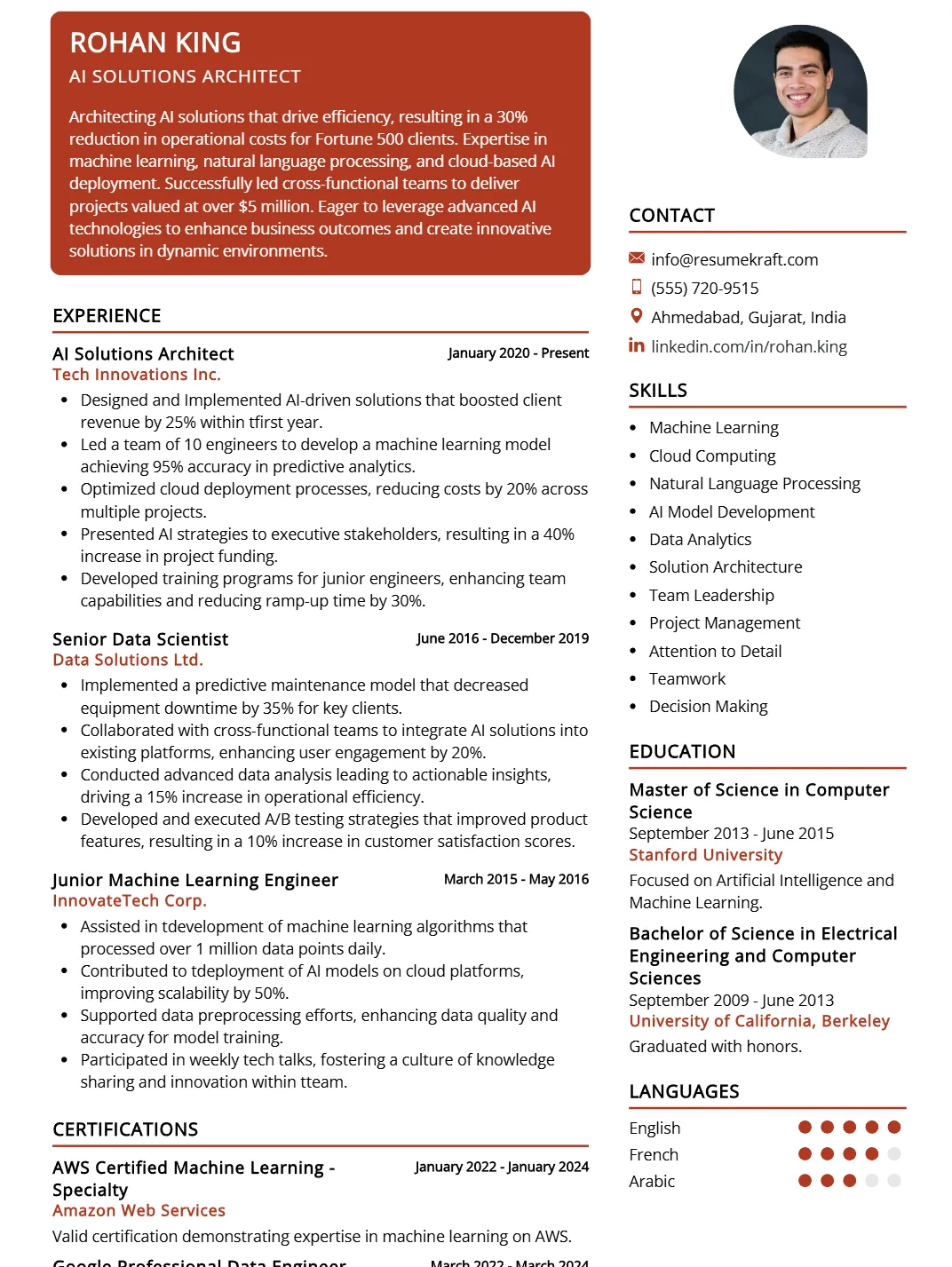
Why This Resume Works
This resume effectively positions the candidate for the AI Solutions Architect role by highlighting relevant skills such as Machine Learning and Natural Language Processing, crucial for developing innovative AI solutions. The structured format emphasizes key experience, showcasing a progressive career from Junior Machine Learning Engineer to Senior Data Scientist, indicating depth of knowledge. Its clear use of industry-specific keywords ensures ATS compatibility, while strategically presented achievements demonstrate tangible impacts in previous roles, reinforcing the candidate’s suitability for tackling complex AI challenges in this field.
Machine Learning Lead Resume
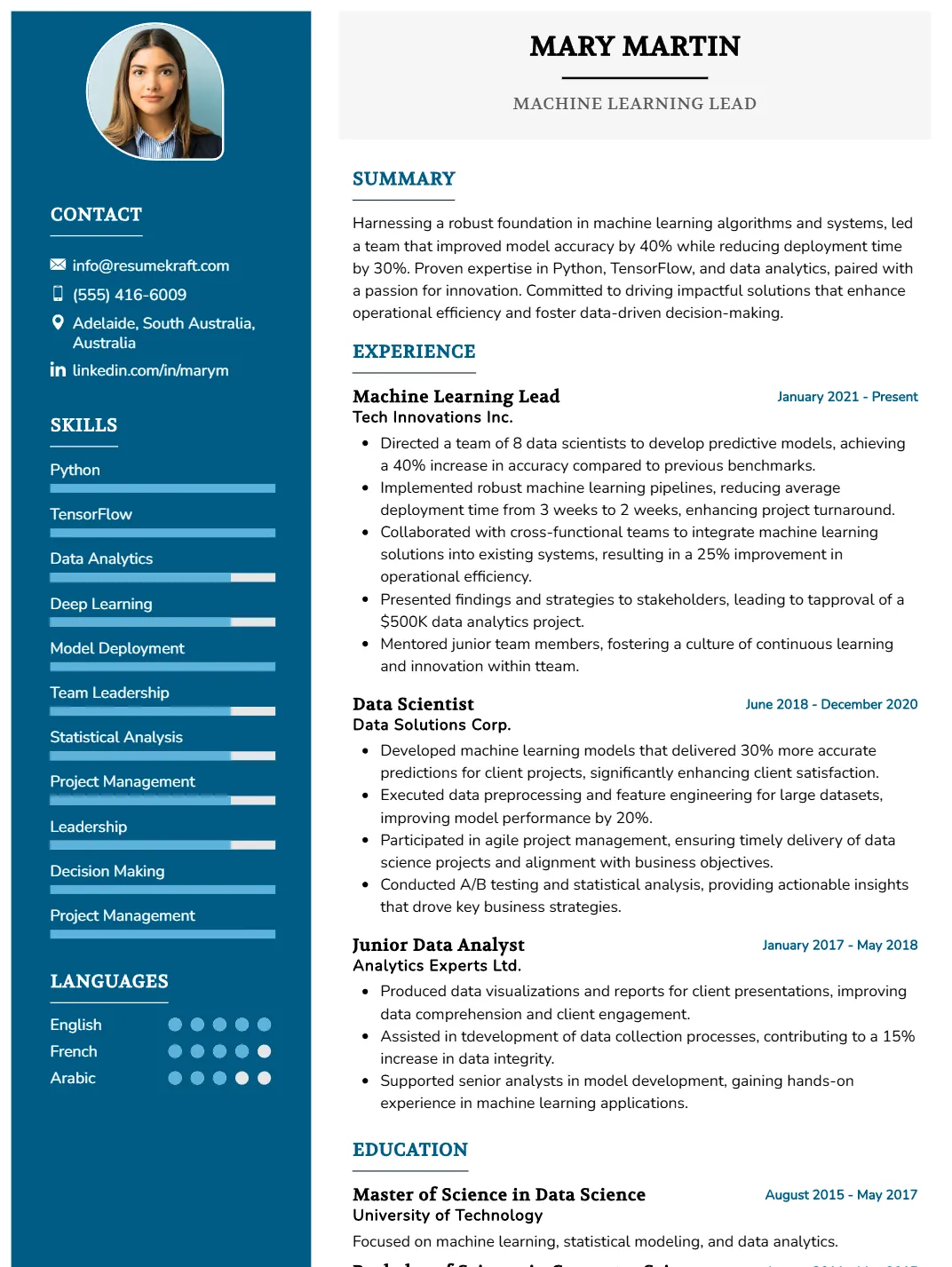
Why This Resume Works
This resume effectively showcases the candidate’s expertise for a Machine Learning Lead position by highlighting key skills in Python, TensorFlow, and Deep Learning, demonstrating technical proficiency essential for leadership roles. The structured format presents a clear career progression from Junior Data Analyst to Machine Learning Lead, emphasizing relevant experience over seven years. It is optimized for ATS compatibility with industry-specific keywords. Additionally, strategic presentation of achievements in model deployment and data analytics underscores the candidate’s impact, making them a strong fit for the role.
AI Research Scientist Resume
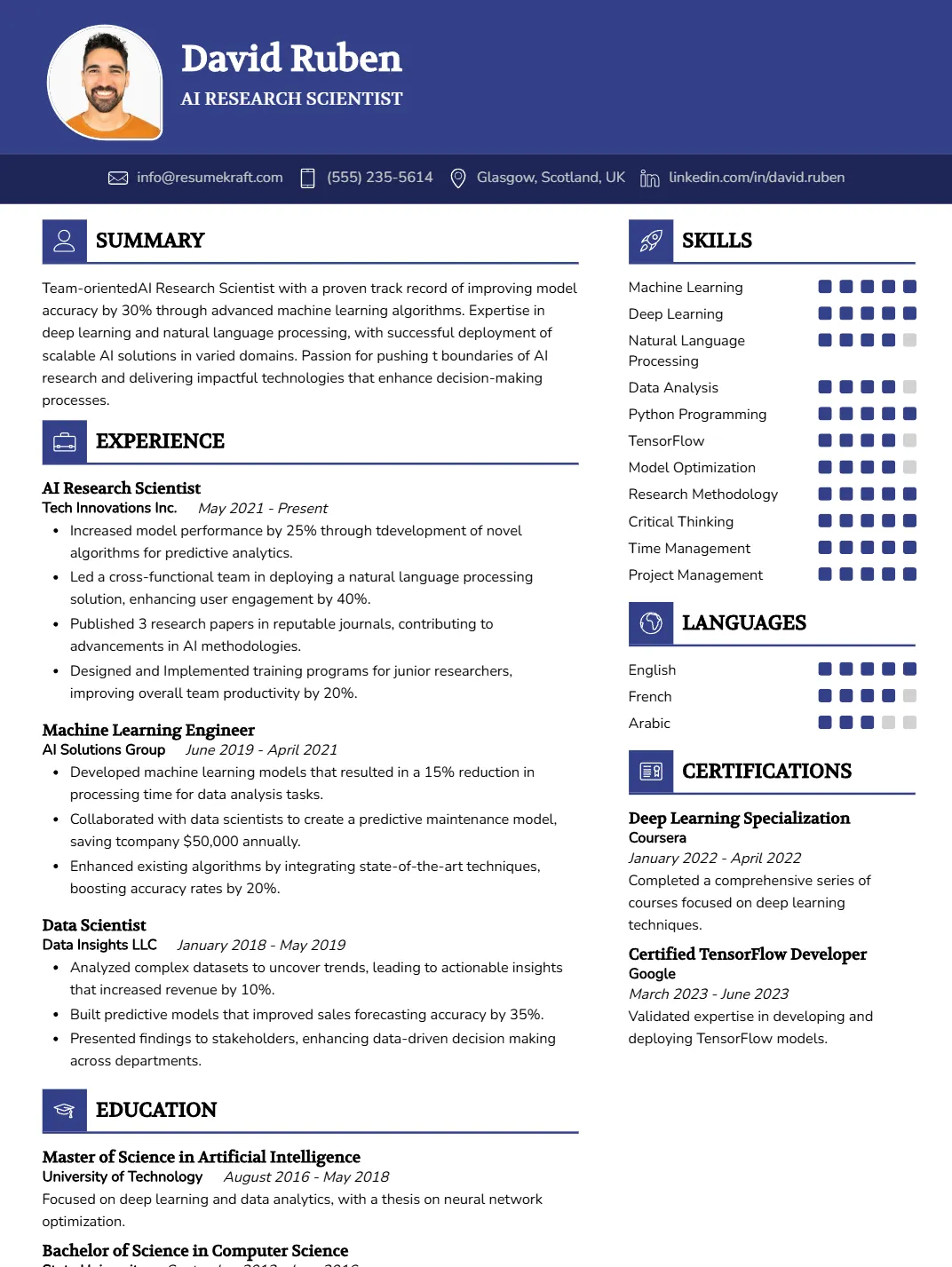
Why This Resume Works
This resume effectively positions the candidate for the AI Research Scientist role by highlighting key skills such as Machine Learning, Deep Learning, and Natural Language Processing, which are essential for this field. With seven years of relevant experience, the structured format clearly outlines their progression from Machine Learning Engineer to Data Scientist, showcasing career growth. The use of industry-specific keywords enhances ATS compatibility, while strategic presentation of achievements emphasizes impactful contributions in AI research, making it a compelling choice for hiring managers.
Lead AI Developer in Natural Language Processing Resume
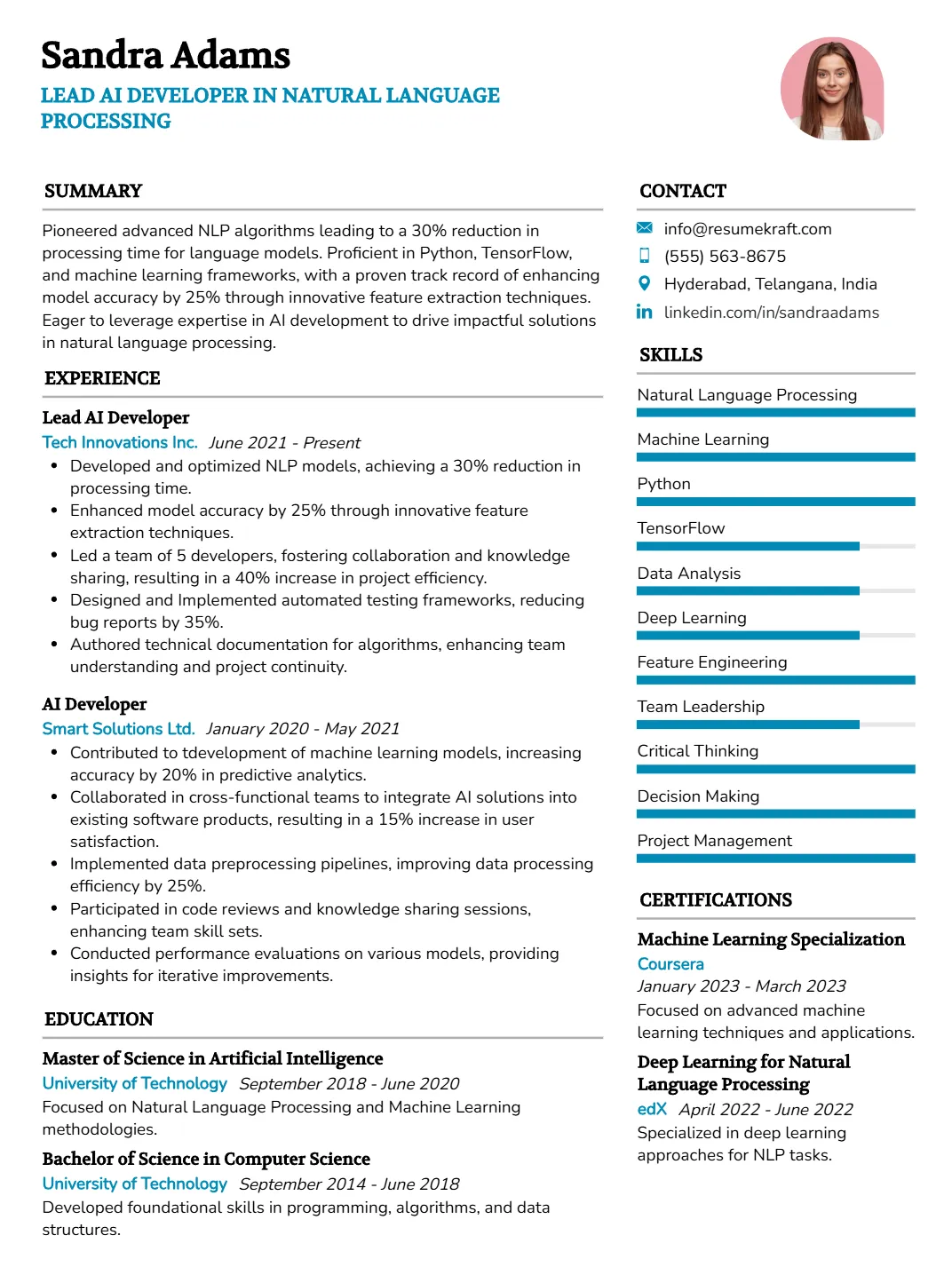
Why This Resume Works
This resume effectively positions the candidate for a Lead AI Developer in Natural Language Processing by highlighting relevant skills such as Natural Language Processing, Machine Learning, and Python expertise. The structured format emphasizes leadership experience as an AI Developer for five years, showcasing both progression and depth in the field. It is ATS-friendly through the use of industry-specific keywords, ensuring compatibility with automated screening tools. Furthermore, strategic presentation of achievements demonstrates tangible impacts in previous roles, aligning with key expectations in this specialized domain.
Principal AI Software Architect Resume
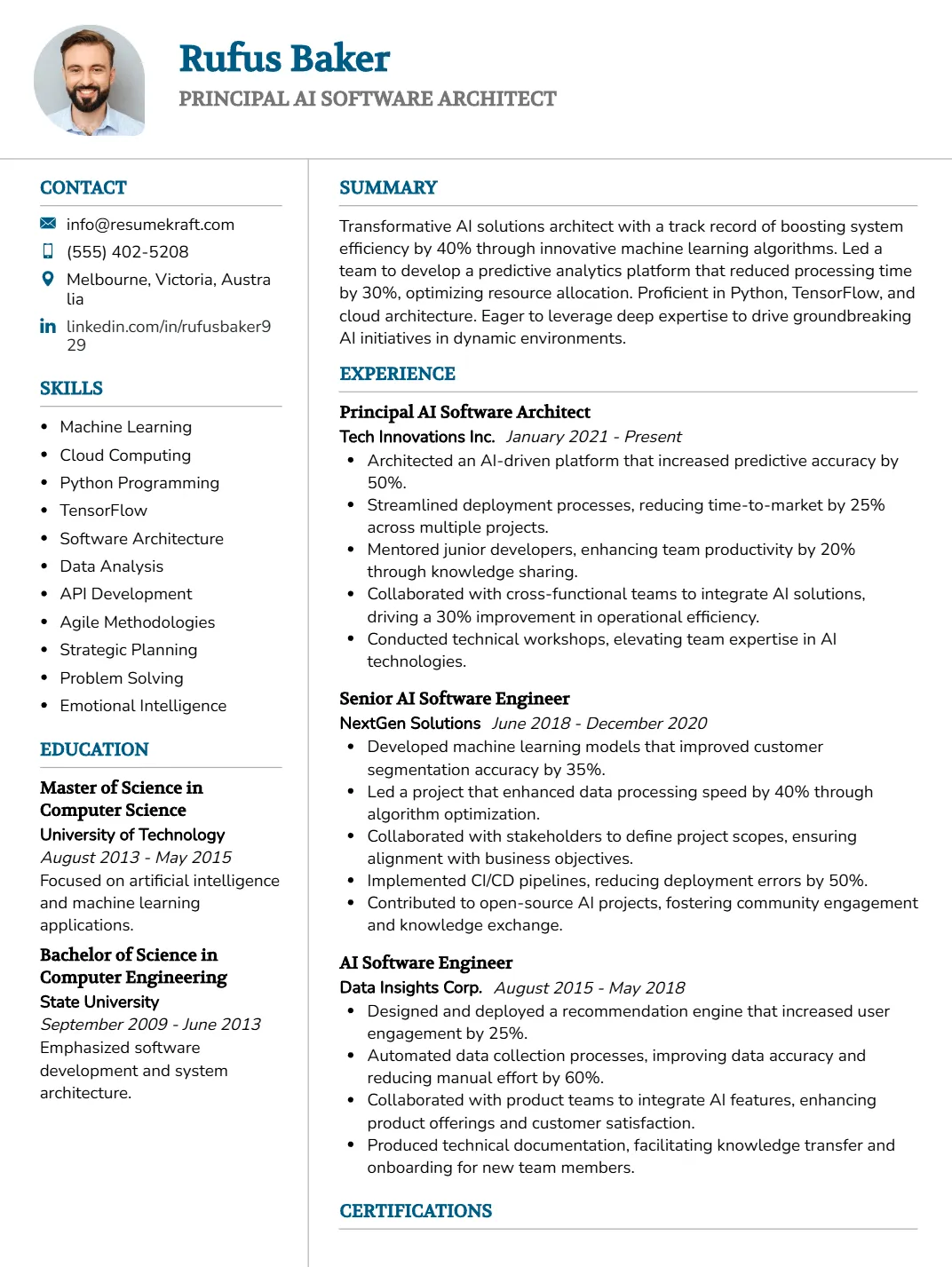
Why This Resume Works
This resume effectively highlights the candidate’s extensive experience as a Principal AI Software Architect and their key skills in Machine Learning, Cloud Computing, and Python Programming. The structured format emphasizes relevant achievements in software architecture, enhancing visibility for hiring managers. Its strategic use of industry-specific keywords ensures compatibility with ATS systems, increasing the chances of passing initial screenings. By showcasing significant contributions to AI projects, this resume aligns perfectly with the responsibilities and requirements of a Principal AI Software Architect role.
AI Ethics Specialist Resume
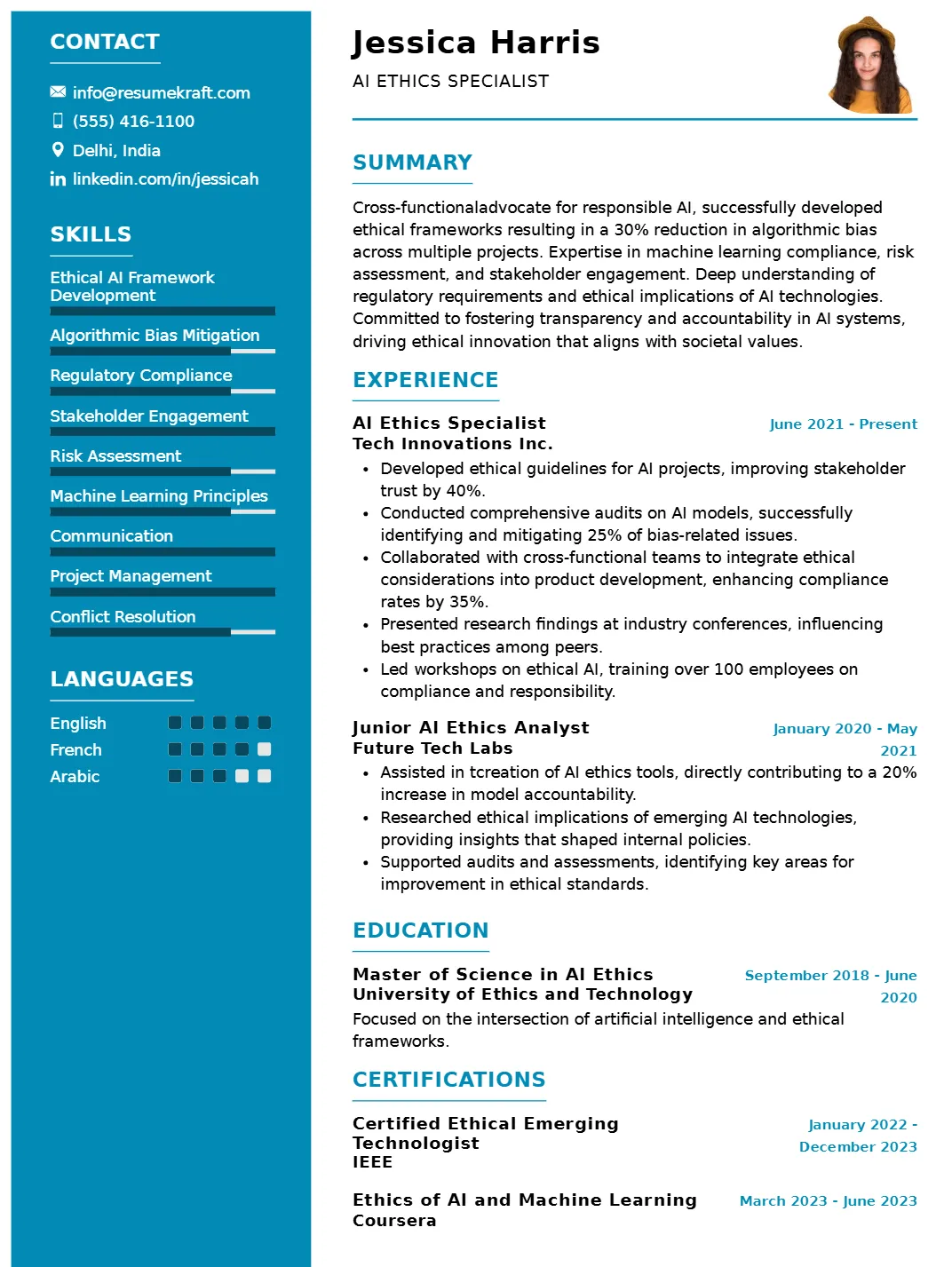
Why This Resume Works
This resume effectively positions the candidate for the AI Ethics Specialist role by highlighting key skills such as Ethical AI Framework Development and Algorithmic Bias Mitigation, directly relevant to industry demands. The structured format enhances readability, ensuring quick assessment of qualifications. It is designed with ATS compatibility in mind, using pertinent keywords that align with job descriptions in AI ethics. Additionally, strategic presentation of achievements in regulatory compliance and stakeholder engagement underscores the candidate’s impact, making them a strong contender for this specialized position.
Generative AI Engineer Resume
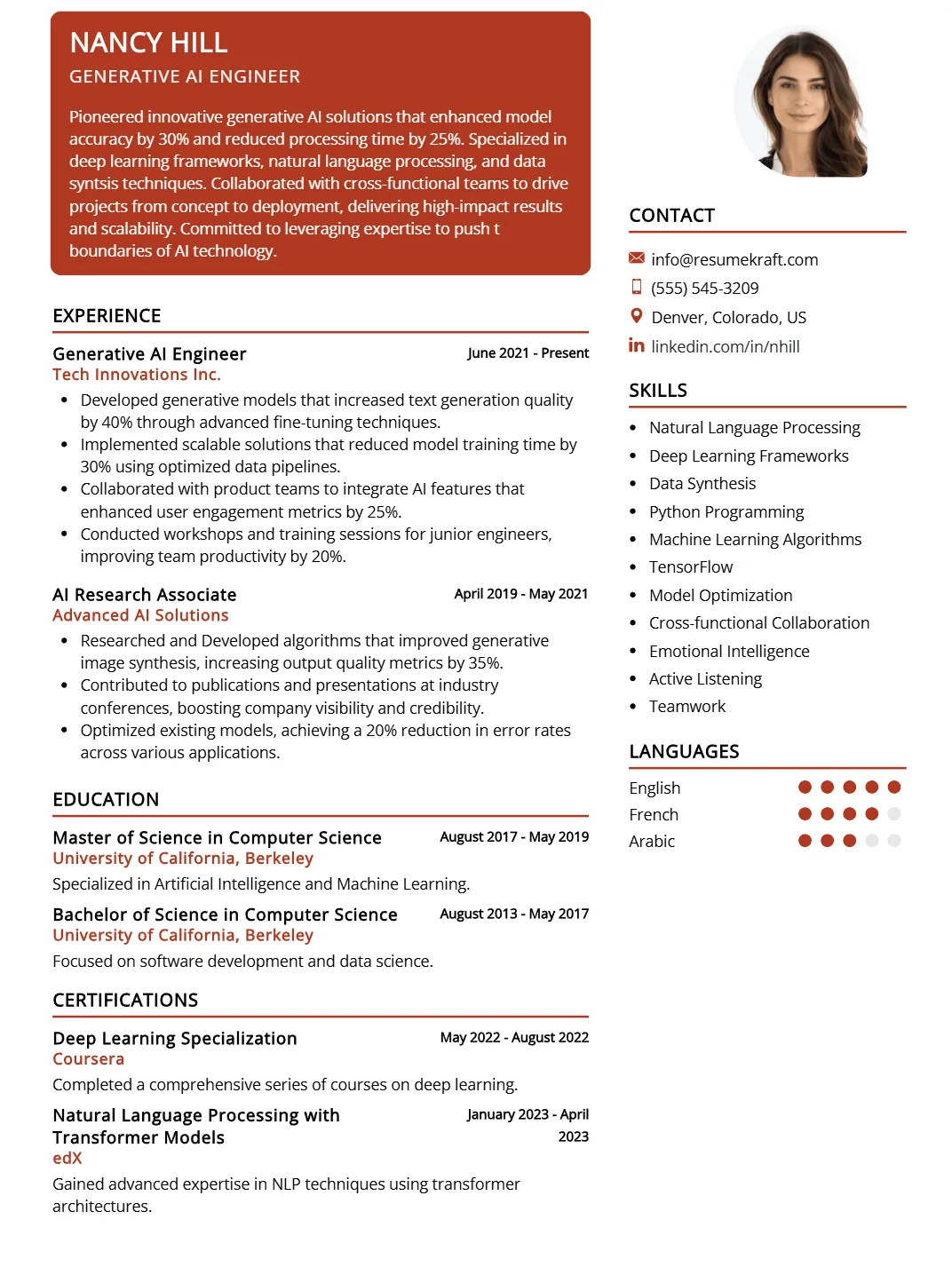
Why This Resume Works
This resume effectively positions the candidate for a Generative AI Engineer role by highlighting essential skills such as Natural Language Processing and Deep Learning Frameworks, directly relevant to the position. With six years of experience in generative AI, it showcases a strong foundation in machine learning algorithms and Python programming. The format is clear and structured, enhancing readability for both hiring managers and ATS systems. Strategic presentation of achievements emphasizes contributions to data synthesis projects, making the candidate’s qualifications compelling within this specialized field.
AI Systems Integration Expert Resume
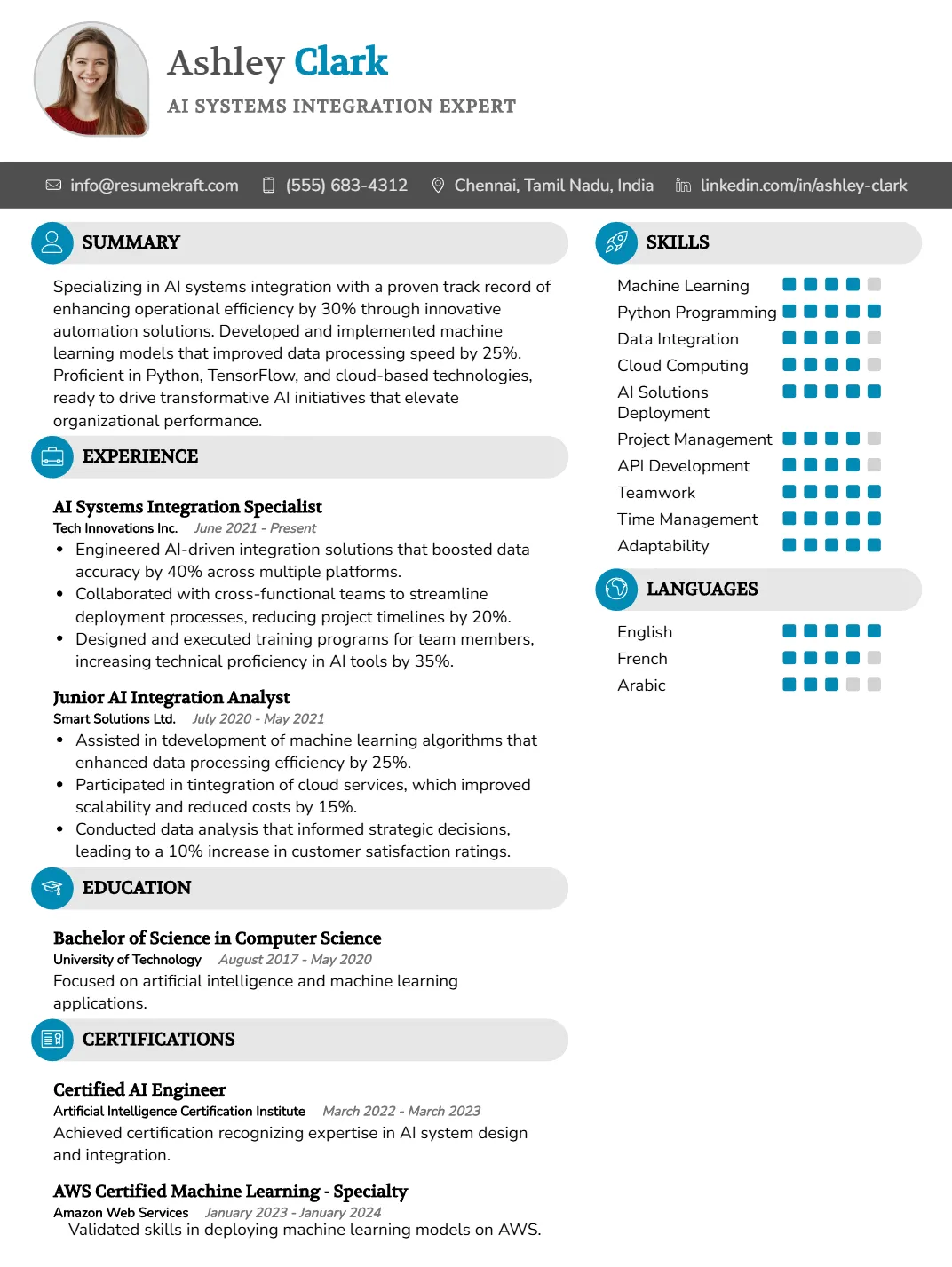
Why This Resume Works
This resume effectively highlights the candidate’s expertise as an AI Systems Integration Expert by emphasizing key skills such as Machine Learning and Cloud Computing, which are vital for the role. The structured format allows for easy navigation, showcasing relevant experience in AI systems integration roles over five years. By incorporating industry-specific keywords, the resume ensures ATS compatibility, enhancing visibility to recruiters. Additionally, strategic presentation of achievements demonstrates successful deployment of AI solutions, reinforcing the candidate’s qualifications in this competitive field.
AI Product Manager Resume
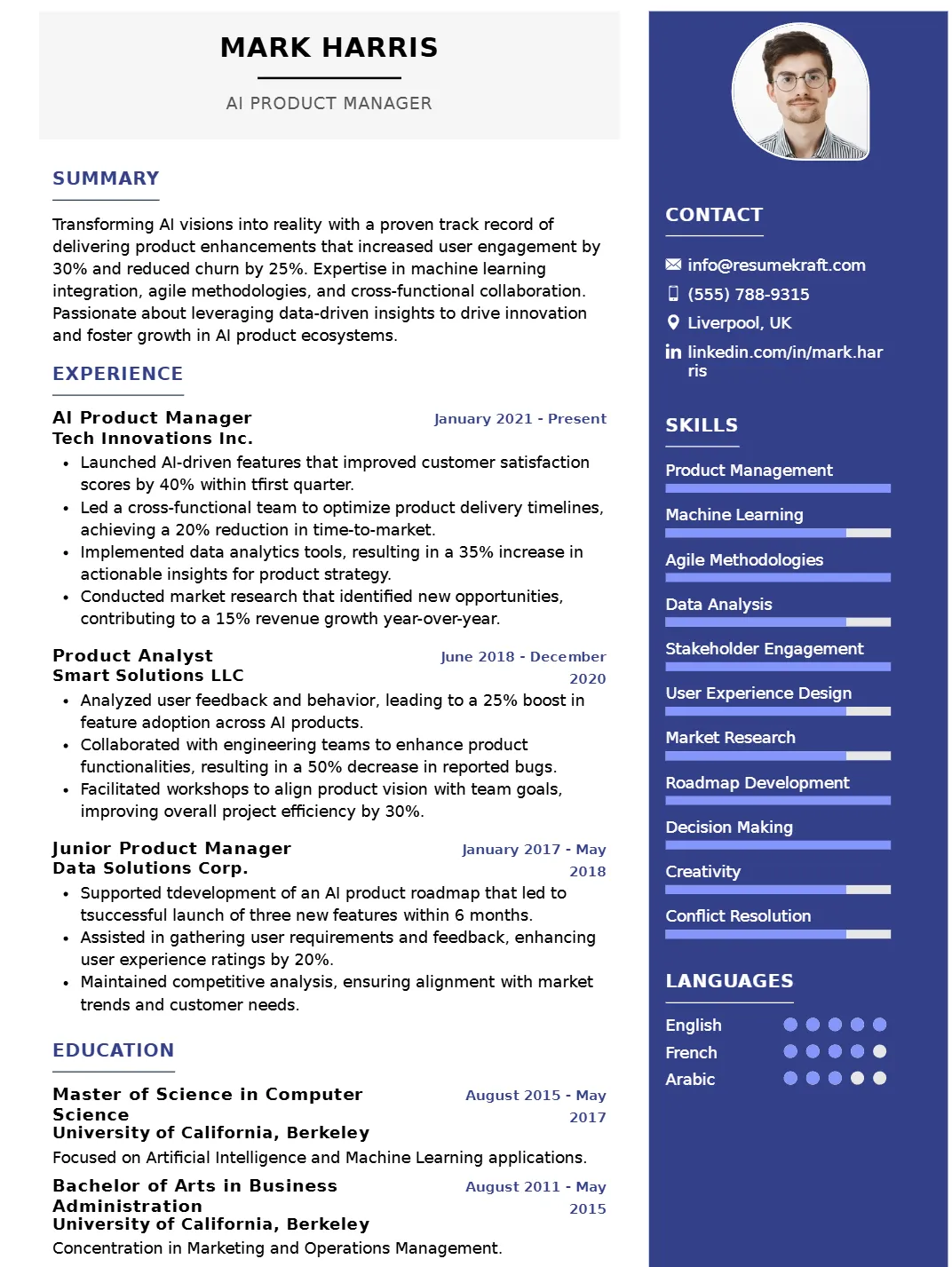
Why This Resume Works
This resume effectively positions the candidate for an AI Product Manager role by highlighting relevant skills such as product management and machine learning, essential for driving AI initiatives. With approximately seven years of progressive experience, including roles as a Product Analyst and Junior Product Manager, it demonstrates a solid career trajectory. The structured format ensures clarity and ease of navigation, enhancing ATS compatibility. Additionally, strategic presentation of quantifiable achievements showcases impact in previous positions, aligning with industry expectations for measurable outcomes in AI product development.
How to format a AI Engineer resume
Proper formatting is crucial for an AI Engineer resume, as it enhances readability and showcases your technical skills effectively. A well-structured resume format allows hiring managers to quickly identify your qualifications and experience in the competitive tech landscape.
- Use a clean, professional font like Arial or Calibri at 10-12 points to ensure readability. Avoid overly stylized fonts that may distract from your content.
- Organize your resume into clear sections: Contact Information, Summary, Skills, Experience, and Education. This structure allows hiring managers to navigate your qualifications effortlessly.
- Use bullet points for your experience and skills to present information in a concise manner. Each bullet should start with an action verb to emphasize your achievements and contributions.
- Incorporate relevant keywords from the job description throughout your resume. This practice not only helps with applicant tracking systems but also highlights your alignment with the role.
- Maintain consistent margin spacing and alignment throughout your resume. This attention to detail reflects your professionalism and can create a more visually appealing document.
How to write your AI Engineer resume experience
Effectively presenting work experience on an AI Engineer resume is crucial, as it highlights your technical skills and relevant accomplishments to potential employers. This section demonstrates your ability to apply AI concepts in real-world settings, showcasing the depth of your expertise and problem-solving capabilities, which are essential for this role.
Employers seek specific outcomes, quantifiable achievements, and a clear understanding of the technologies you’ve worked with. They want to see how your contributions have impacted projects or business goals, making it vital to articulate your experiences in a way that speaks to your effectiveness as an AI Engineer.
Worked on various AI projects, including machine learning and data analysis. Helped improve some systems.
Developed a machine learning model that increased predictive accuracy by 30%, resulting in a $200K cost savings for the company. Collaborated with cross-functional teams to deploy AI solutions across three major projects.
How to list your hard skills and soft skills on your resume
In the rapidly evolving field of artificial intelligence, a well-crafted resume must highlight both hard and soft skills to effectively demonstrate a candidate’s qualifications. Hard skills, such as programming languages and technical knowledge, showcase a candidate’s ability to perform specific tasks and utilize tools essential for AI development. Meanwhile, soft skills like communication and problem-solving are crucial for collaboration and innovation within teams, making them equally important in illustrating how an AI Engineer can contribute to a project’s success.
Hard Skills:
- Python: Proficient in using Python for machine learning and data analysis.
- TensorFlow: Experienced in building and deploying machine learning models using TensorFlow.
- Data Analysis: Skilled in analyzing large datasets to extract meaningful insights.
- Neural Networks: Knowledgeable in designing and implementing neural network architectures.
- Natural Language Processing: Competent in developing algorithms for text analysis and generation.
- Computer Vision: Expertise in image processing and object recognition techniques.
- Algorithms: Strong understanding of algorithm design and data structures for optimization.
- Statistics: Familiar with statistical methods and their application in AI models.
- Big Data Technologies: Knowledgeable in tools like Hadoop and Spark for handling large datasets.
- Cloud Computing: Experience with cloud platforms such as AWS and Azure for AI deployments.
- Version Control: Proficient in using Git for source code management and collaboration.
- API Development: Capable of creating and integrating APIs for machine learning applications.
- Model Evaluation: Experienced in metrics and techniques for assessing model performance.
- Robotics: Understanding of robotics principles and their application in AI solutions.
- Software Development: Proficient in software engineering principles and development practices.
Soft Skills:
- Problem Solving: Strong analytical skills to identify and resolve complex challenges.
- Collaboration: Ability to work effectively within cross-functional teams.
- Communication: Proficient in conveying technical concepts to non-technical stakeholders.
- Adaptability: Quick to adjust to new technologies and changing project requirements.
- Creativity: Capable of thinking outside the box to develop innovative AI solutions.
- Critical Thinking: Able to evaluate multiple perspectives and make data-driven decisions.
- Time Management: Skilled in prioritizing tasks to meet deadlines efficiently.
- Attention to Detail: Meticulous in ensuring accuracy in code and data analysis.
- Leadership: Experience in guiding teams and mentoring junior engineers.
- Curiosity: Eager to learn new methodologies and stay updated with industry trends.
- Empathy: Understanding user needs to create user-centric AI applications.
- Conflict Resolution: Competent in mediating disagreements and fostering a positive work environment.
- Resilience: Ability to maintain productivity under pressure and overcome setbacks.
- Networking: Skilled at building professional relationships within the tech community.
- Presentation: Capable of delivering engaging presentations to diverse audiences.
How to list your certifications and education on your resume
To effectively present certifications and education on an AI Engineer resume, focus on highlighting relevant degrees and specialized certifications that demonstrate your expertise in artificial intelligence and machine learning. Relevant educational qualifications typically include a degree in computer science, data science, or a related field, alongside certifications from recognized institutions like TensorFlow, AWS, or Microsoft Azure that validate your skills in AI technologies.
When listing your education and certifications, be sure to include the institution’s name, degree or certification title, and the date of completion. This structured format allows hiring managers to quickly assess your qualifications and understand your commitment to professional development in the rapidly evolving field of AI.
Went to college and learned about AI. Have some certifications from online courses.
M.S. in Computer Science, Stanford University, 2022; Certified TensorFlow Developer, 2021; AWS Certified Machine Learning Specialty, 2023.
How to write your AI Engineer resume summary or objective
A strong resume summary or objective is crucial for an AI Engineer position as it provides a snapshot of your skills, experience, and career aspirations. A well-crafted summary showcases your qualifications and sets the tone for the rest of the resume, while an objective statement can clarify your intentions and professional goals, particularly for entry-level candidates or those transitioning careers. Use a summary when you have relevant experience to highlight, and opt for an objective when you want to emphasize your career ambitions.
Looking for a job in AI. I have some experience and want to work in a tech company.
Detail-oriented AI Engineer with 5 years of experience in machine learning and deep learning, seeking to leverage expertise in developing innovative AI solutions at a leading tech firm.
Additional sections for a AI Engineer resume
Including additional sections in your AI Engineer resume can significantly enhance your candidacy by showcasing relevant experiences and skills that align with the role. These sections can highlight your unique qualifications and make you stand out in a competitive job market.
- Projects: Detail specific AI-related projects you have worked on, including technologies used and outcomes achieved. This demonstrates your practical experience and ability to apply theoretical knowledge in real-world scenarios.
- Certifications: List any relevant certifications such as TensorFlow Developer or AWS Certified Machine Learning. These validate your skills and commitment to staying updated with industry standards and technologies.
- Publications: If you have contributed to research papers or articles in AI, include them. This highlights your expertise and thought leadership, showcasing your contributions to the field and ability to engage with complex concepts.
- Technical Skills: Provide a comprehensive list of programming languages, frameworks, and tools you are proficient in, like Python, PyTorch, or TensorFlow. This allows employers to quickly assess your technical capabilities relevant to the role.
- Conferences and Workshops: Mention any relevant conferences or workshops you have attended or presented at. This shows your engagement with the AI community and willingness to learn and share knowledge, which is valuable in a rapidly evolving field.
Key takeaways for writing a professional AI Engineer resume
- Highlight your experience with machine learning frameworks, such as TensorFlow or PyTorch, emphasizing real projects and quantifiable results to demonstrate your expertise.
- Utilize resume templates designed for technical roles to ensure your layout is professional and clearly showcases your skills and achievements.
- Focus on your programming skills, particularly in languages relevant to AI, like Python or R, and include specific projects to validate your competencies.
- Include details about your contributions to AI projects, such as improving model accuracy or processing speed, to provide concrete evidence of your impact.
- Consider using an ai resume builder to streamline the writing process, ensuring you highlight critical skills while maintaining a clean, organized format.
Frequently Asked Questions
How long should my AI Engineer resume be?
Your AI Engineer resume should ideally be one page, especially if you have less than 10 years of experience. This length allows you to succinctly showcase your technical skills, relevant projects, and key accomplishments without overwhelming the reader. If you have extensive experience, you can extend it to two pages, but ensure that every section adds value and focuses on your AI-related expertise and contributions.
What is the best format for a AI Engineer resume?
The best format for an AI Engineer resume is a reverse-chronological format, which highlights your most recent experiences first. This format allows employers to see your latest skills and projects up front. Use clear section headings, bullet points for readability, and a clean layout that emphasizes technical skills, project outcomes, and relevant education. Additionally, consider incorporating keywords from the job description to get past Applicant Tracking Systems.
What should I highlight on my AI Engineer resume to stand out?
To stand out as an AI Engineer, highlight your technical skills in machine learning, deep learning, natural language processing, and programming languages such as Python and R. Showcase specific projects or contributions that demonstrate your problem-solving abilities and innovative thinking. Include any relevant certifications or advanced degrees, and emphasize collaboration on cross-functional teams, as well as any publications or contributions to open-source projects that underscore your expertise in the field.
What are some ways to quantify my experience on my AI Engineer resume?
Quantifying your experience on an AI Engineer resume can significantly enhance its impact. Use metrics to illustrate the results of your projects, such as the percentage increase in model accuracy or reduction in processing time. For example, you might mention that you improved a predictive model’s accuracy by 20%, or reduced data processing time by 30%. Highlight the scale of projects, such as the size of data sets you worked with or the number of users impacted by your solutions to provide concrete evidence of your contributions.

